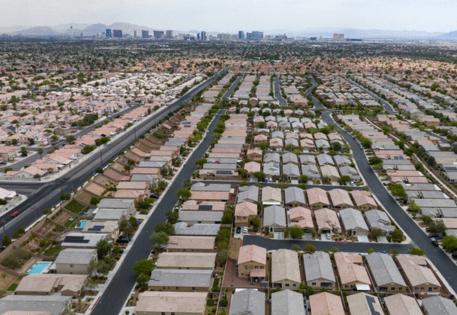10,000 acres of prime land sitting vacant in Las Vegas Valley: report
Published in Home and Consumer News
Approximately 10,000 acres of prime land that could be developed are sitting vacant in Southern Nevada, according to a new study.
A total of 31,650 tax lots, encompassing 78,285 undeveloped or underutilized acres, with 10,000 of those acres considered prime for residential and commercial development potential are available in the region, according to a new study from policy research firm ECOnorthwest. The study also shows that of the 78,285 acres, 23,480 of them are federally owned or controlled.
ECOnorthwest developed the study with help from the Regional Transportation Commission of Southern Nevada.
Nicholas Irwin, research director of UNLV’s Lied Center for Real Estate, said part of the problem the valley has in trying to solve its housing crisis is properly identifying all of the land in the area, who owns it and if it can be developed. A recent report from Applied Analysis, a local research firm found the valley could run out of land to develop in as little as seven years.
“This (ECOnorthwest) report does shine a light down a dark hallway where we don’t know a lot about what we need and our current land situation, and this report provides a bit of illumination down that hallway, but there are a lot of additional corners there that need much more poking and prodding.”
Irwin said there are many barriers in obtaining relevant data on the valley’s available land given many government departments, including the Secretary of the State’s office don’t share data on land use and ownership.
Clark County has previously confirmed to the Las Vegas Review-Journal that the federal government owns 88 percent of all land in the county, and the Bureau of Land Management manages more than half of that. The BLM’s Southern Nevada district confirmed that it manages 2.6 million acres alone in Clark County. The BLM has been slow to release land for private use dating back to 1998 when the Southern Nevada Public Land Management Act was first passed.
However, since the act was passed with the purpose of specifically offloading federally controlled land in the area, only approximately 17,519 acres have been released and BLM has actually increased its share of land control within the state, according to multiple reports.
The valley finds itself in the middle of a housing crisis as home prices are just below record highs and a glut of resale supply has flooded the market with no buyers in sight. High mortgage rates and a lack of new home supply have further strangled the market coupled with increased construction and labor costs putting pressure on homebuilders.
Home prices have essentially doubled since before the pandemic started, and Maurice Page, director of the Nevada Housing Coalition, said the region is at a “pivotal” point when it comes to addressing its housing needs. Multiple studies have shown the valley is short on affordable housing, a number that has been growing steadily the past few years.
“With there being more than 78,000 acres of land that are either vacant or underutilized, this shows that we have substantial opportunities for infill and redevelopment within existing urban boundaries,” he said. “However, despite this potential, we still face a shortage of at least 78,000 affordable rental homes for low-wage workers, and the income needed to afford a typical mortgage has more than doubled since 2020, from $54,000 to nearly $120,000.”
Page said the result of land constraints are putting the most pressure on low income residents of the valley. The average home in the Las Vegas Valley has essentially doubled since before the pandemic started in 2019 and wages have not risen in lockstep with the cost of homeownership.
“So even as land is available, these numbers illustrate a growing affordability gap. We need new incentives and infrastructure investments to unlock that land for housing development that meets the needs of all Southern Nevadans.”
___
©2025 Las Vegas Review-Journal. Visit reviewjournal.com.. Distributed by Tribune Content Agency, LLC.








Comments